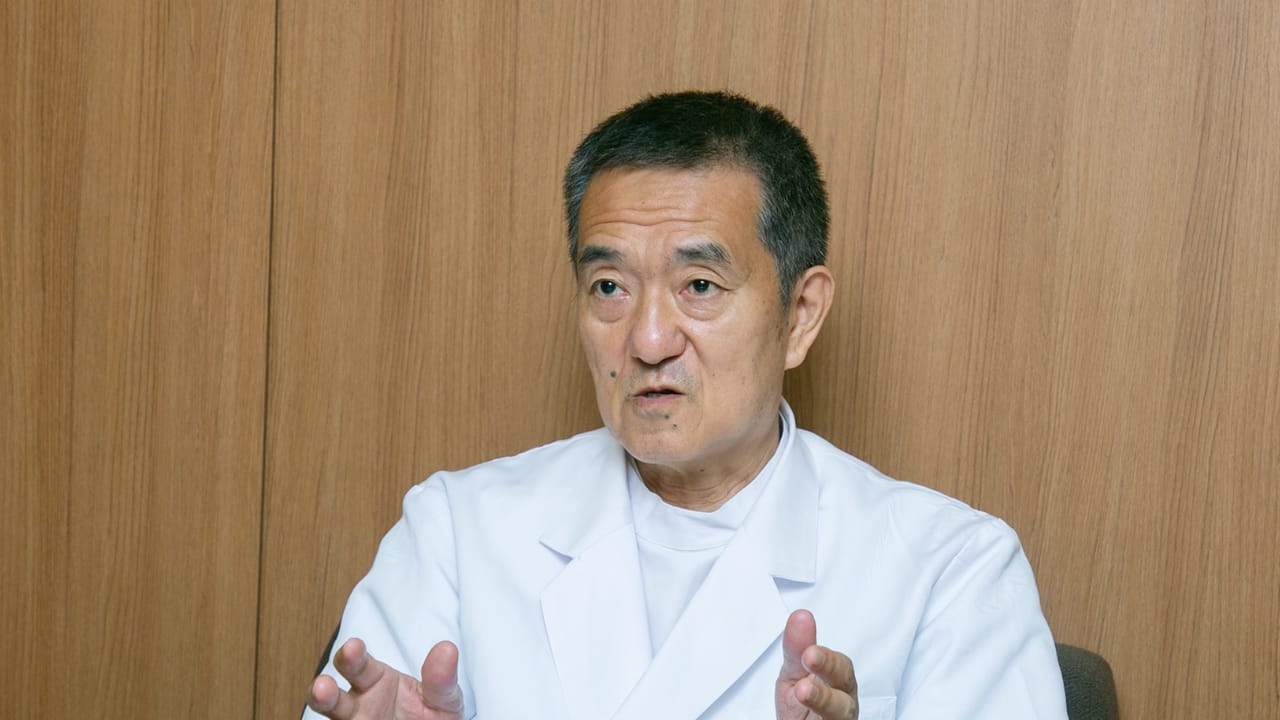ASOURCE®TIMES

がん・感染症センター 都立駒込病院院長
神澤輝実
1982年弘前大学医学部卒業。1986年東京都立駒込病院内科医員、2008年同院内科部長、2015年がん・感染症センター都立駒込病院副院長、2019年4月より現職。日本胆道学会、日本膵臓学会、日本消化吸収学会、日本高齢消化器病学会、日本膵臓病研究財団の理事などを歴任
感染症治療の専門病院として長い歴史を持つがん・感染症センター都立駒込病院は「がんと感染症」に重点を置いて専門的な診療機能を提供している。がんに対する高度な医療の進歩は、その一方で薬剤耐性菌などによる感染症の増加をもたらす。そのため、院内における感染症対策も課題の1つとなっている。今年4月から院長に就任した神澤輝実氏に、感染対策の意義や取り組みなどについて語っていただいた。
当院は、1879年に、国内で大流行していたコレラの「避病院」として開設され、いろいろな感染症を診療する伝染病院として多くの実績を上げてきました。2007年からは、エイズ診療中核拠点病院として数多くのHIV感染者の診療を行い、その診療実績は全国屈指です。2010年には「第一種感染症指定医療機関」に指定され、エボラ出血熱、ペスト、マールブルグ病、ラッサ熱などの感染症の診療に対応できる専用病棟を整備。危険性の高い感染症診療を行うために、日頃から、防護用具の着脱などの訓練を実施しています。
そして、2011年、がん・感染症に対する高度専門医療を提供する病院としての位置付けを明確にして、がん治療についても先進的治療を行う病院となりました。現在は、「がん診療連携拠点病院」および「造血幹細胞移植推進連携病院」の指定を受けており、東京都のがん診療においても中心的な役割を担っています。入院患者の7割はがん患者が占めています。がんに対する高度な医療の進歩は、その一方で薬剤耐性菌などによる感染症の増加をもたらします。すなわち、免疫不全による発熱性好中球減少症(FN)併発例などが多く、必然的に抗菌薬の使用量も増え、耐性菌の発生リスクが高い傾向にあります。そのため、院内における感染症対策も、大きな課題の1つとなっています。
当院の感染対策においては、感染症科と感染制御科が連携し、院長直轄となる感染症専門医、感染症専任看護師、臨床検査技師、薬剤師、放射線技師、栄養士、事務職などの多職種で構成された感染対策チーム(ICT:Infection Control Team)を組織し、対応に当たっています。また、抗菌薬適正使用支援チーム(AST:Antimicrobial Stewardship Team)を設置し、抗菌薬使用に関する課題を洗い出し、目標を明確にしてスピーディーに取り組んでいます。
感染対策としては、➀抗菌薬の適正使用 ➁サーベイランスの実施 ➂標準予防策の徹底—などを重点的に取り組んでいます。➀では、ICTとASTの薬剤師が中心となり、抗菌薬使用量のモニタリング情報を病棟専任薬剤師と共有しながら、病棟での適正使用を推進しています。特に造血幹細胞移植が年間約120例と多いため、必然的に抗菌薬の使用量が多くなり、耐性菌の発生リスクも一般病院よりも高い傾向にあります。このため、症例に応じてASTの薬剤師と感染制御科の医師が協力して、アドバイスや症例のコンサルテーションを行っています。➁のサーベイランスの実施では、特に薬剤耐性菌に関連するデータ収集に力を入れています。耐性菌やクロストリディオイデス・ディフィシルが検出された場合には、ICTメンバーが医療従事者の標準・接触予防策の実施状況などを確認し、問題があれば、病棟スタッフを指導します。耐性菌の日頃からのチェックは、アウトブレイクの防止につながるものと思います。➂では、全職員を対象に、ICTセミナー(年3回)や院内感染対策講習会(年2回)を実施しています。また、手指衛生やマスクの着用などの基本事項を毎週チェックし、習慣化することを目指しています。手指衛生については、擦式手指消毒使用量や直接観察法でチェックしています。消毒使用量は増えていますが、「5つのタイミング」(➀患者に触れる前②清潔・無菌操作の前③体液に暴露された可能性がある場合④患者に触れた後⑤患者周辺の物品に触れた後)全てで励行されているまでには至っておらず、さらなる啓発活動が必要です。
また、感染防止対策と業務の効率化の観点から、生検鉗子、ガイドワイヤー、Safety(安全機構付き)製品などディスポーザブル製品の使用が多くなっています。診療材料費はかかりますが、これも時代の流れかもしれません。
感染対策は、成果が見えにくいところもありますが、日頃より地道に積み重ねて行かなければなりません。問題が起きてからでは手遅れなのです。MRSAを含む耐性菌のアウトブレイクが起きると、病院の信用が揺らぐほか、医療費が増大し、場合によっては、病床閉鎖や入院制限を余儀なくされ、病院の経営に極めて大きな打撃となります。アウトブレイクによる損失を生まないよう、日常の感染対策を抜かりなく行なうことが大切です。アウトブレイクが生じる要因の1つとして、スタッフ間での意識のずれや情報共有不足も上げられます。スタッフ間のコミュニケーションを密にして、感染対策に対する意識をことあるごとに喚起する努力も重要といえます。